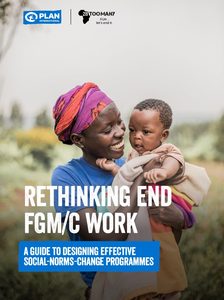Social-norms-change approach for end FGM/C programmes
A guide to designing effective social-norms-change programmes to end FGM/C
This guidance package aims to support programme staff to design more effective end FGM/C interventions, by providing a social-norms-change approach that ensures the right questions are asked and locally relevant strategies are developed.

Over the past few decades, many strategies to reduce female genital mutilation/cutting (FGM/C) have been developed. Although there has been a decline in the rate of FGM/C in many countries, it has not been keeping up with the population growth, resulting in a continued rise of absolute numbers of girls and women affected. In addition, it has long been felt that most of the interventions that have been tried failed to take full account of the cultural and social context in which they occurred.
There is a growing consensus that a more effective approach to reducing FGM/C would be through culturally sensitive, community-based programmes that lead to a shift in the deeply embedded social norms that uphold the practice – a social-norms-change approach. This means recognising that there is no one-size-fits-all strategy, that the beliefs and values of each community have to be addressed individually, and the key decision-makers and influencers in each community must be engaged from the start.
Overview
These guidelines suggest that changing the social norms related to FGM/C may be achieved through 3 distinct phases: increasing knowledge, changing attitudes and shifting practice.
The guidelines comprise 4 stages:
- Scoping phase – context is critical. This stages explains the questions that need to be asked and the data gathered to fully understand the social environment in which FGM/C is taking place in a specific location.
- Programme analysis and design phase – the process of designing your strategy/ies on the basis of the context you have researched.
- Implementing your plan – looking at some of the features found essential for delivering the social norms approach.
- Assessing programme impact – based on the social norms approach, what sort of monitoring and evaluating system can be used to assess the programme.
Download the guide
FGM/C Social Norms Change Guidelines (ENG)
12.95 mb
Categories: Protection from violence, Sexual and reproductive health and rights


